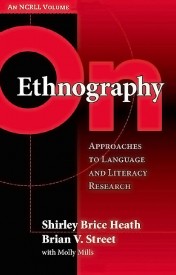On Ethnography

Since the early 1980s, ethnography, the time-honored genre of cultural and social anthropologists, has morphed into a set of methods used by not only social scientists, but also clinicians in nursing, marketing, and creative leadership training. While recognizing the practical value of methods considered to be "ethnographic" in a host of fields, Heath has stayed very much with the idea that grounding in theories of linguistic anthropology and long-term comparative fieldwork provide a type of knowledge not available through short-term "ethnographic" methods. Many of her publications address methods of research toward ethnography and the special difficulties that fieldwork in linguistic anthropology faces with some populations (e.g., peer groups of adolescents). Some of her publications address the disadvantages to Education of the loss of training in the disciplines by those who undertake "education research."
Fundamental in much of Heath's work has been the involvement of those being studied in the nuts and bolts of collecting and analyzing language data. She has taken part in such work with young mothers documenting book-reading with their children (see Books Wolf & Heath,The Braid of Literature: Children's worlds of reading. 1992; Papers Heath, Branscombe, & Thomas, 1986) and teachers in special education classes (Heath & Branscombe, 1986). She has also enlisted adolescents as members of a long-term study of learning environments beyond the school and family. They have kept diaries of their mindful attention to art during selected days, interviewed key learners in their lives, and analyzed their participation in specific group-centered activities [see the bibliography in ArtShow, Heath & Smyth, 1999).
Increasingly, the fine-grained observational work of studying learning-in-process can be informed by recent studies in the neurosciences. Note, for example, the first two references noted below.
2015 (with Lisa Gilbert). "Creativity and the work of art and science: A cognitive neuroscience perspective". In International handbook of arts and education. London: Routledge. Pp. 398-409.
2015. "Museums, theaters, and youth orchestras: Advancing creative arts and sciences within under-resourced communities". In William G. Tierney, Ed. Rethinking education & poverty. Special issue of The Annals of the American Academy of Political and Social Science. Baltimore: John Hopkins University Press. Pp. 177-200.
2008. (with Brian Street and Molly Mills). On Ethnography: Approaches to Language and Literacy Research. New York: Teachers College Press.
1999. "Discipline and Disciplines in education research: Elusive goals?" In Issues in Education Research: Problems and Possibilities. E. C. Lagemann & L. S. Shulman, eds. San Francisco, CA: Jossey Bass. Pp. 203-233.
1997. "Culture: Contested Realm in Research on Children and Youth". Applied Developmental Science 1.3:113-123. [PDF Available]
1995. (with Steve Athanases). Ethnography in the study of the teaching and learning of English. Research in the Teaching of English. 20.3:263-287
1995. Ethnography in Communities: Learning the Everyday Life of America's Subordinated Youth. In Handbook of Research on Multicultural Education. J.A. Banks & C. Banks, eds. New York: Macmillan. Pp. 1[PDF Available]
1993. "The Madness(es) of Reading and Writing Ethnography". In Anthropology and Education Quarterly. 24.3: 256-268 [PDF available]

